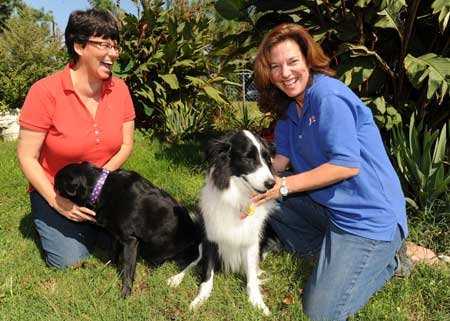FAYETTEVILLE — A local pet behavior counseling service is now providing victims of domestic violence with a furrier form of therapy.
"For victims of domestic violence, accepting physical affection can be difficult," said Denise Holmes, pet behavior counselor for Ain't Misbehavin'. "Animals can cross boundaries that humans can't. They help victims focus on something other than their own trauma."
Holmes, who recently partnered with the Peace at Home Family Shelter, is bringing trained human-animal teams to visit children who've survived domestic violence. Volunteers are registered and trained through the Delta Society - a national nonprofit organization. In addition to completing the Delta Society's Pets Helping People training program, participants are screened by a nationally licensed evaluator.
"I've been working with dogs since 1995, and I've seen some absolutely amazing things happen," said Holmes, who developed the Pawsitive Connection therapy dog prep-course. "It can be something as simple as a child who never speaks saying the dog's name. I once saw a person in a coma, who was awake but couldn't make intentional full movements. When we took a dog in to visit, the first purposeful movement that patient made was to scratch the dog's head. That's a major break through."
Judith Selle, Peace at Home executive director, said the program has already made a noticeable impact on children at the shelter.
"Sometimes, we'll have 20 kids in a room, and they become so rambunctious that they have trouble containing themselves," she said. "When the dogs come into the room, these children wait patiently in line for the opportunity to throw a ball or to give that dog a kiss and a hug around the neck. It's a really cool thing to watch, and we're so appreciativeof this program."
Teams visiting Peace at Home provide a variety of animal-assisted activities aimed at raising spirits, reducing anxiety and encouraging group activity. Therapy visits take place each Tuesday from 6-7 p.m. during adult group therapy.
Therapy dogs include Timmy, a border collie mix, and Ella, a lab mix.
"Timmy is very active and enjoys running and fetching his ball," Holmes said. "Ella enjoys lying quietly and provides her own brand of unconditional love. She was abused by her previous owner, so she has something in common with many of the children of Peace at Home."
While the Pawsitive Connection course is not a requirement for therapy dogs, Holmes said the program was specifically designed to train dogs and owners as a team.
"I started as a volunteer myself and later became an animal evaluator and site assessor," she said. "After going into health and human service facilities, I started to notice a hole in the system because there were no classes for handlers and their animals to take together. That's why I developed this program. I call it my Kaplan course for therapy dogs."
Because they're instructed as a team, therapy dogs can only make site visits with their trained owners.
Selle said Peace at Home hopes to make the therapy dogs a regular part of treatment for domestic violence survivors. The program, she said is just one of a variety forms of therapy offered by the shelter.
"Different children relate to different things," she said. "That's why we also offer art therapy, family therapy and traditional therapy. For some kids, the therapy dogs really resonate with them and help open them up. We're just pleased to offer such a broad range of therapeutic approaches designed to meet each person's specific needs."
Peace at Home has been offering its services in Northwest Arkansas for more than 30 years.
According to its Web site, the shelter serves as a "protective, nurturing place for abused women and children to find safety, provides women with the necessary tools to become independent and helps educate the community on how to end domestic violence."
For more information, visit www.lovetrustteach.com or www.peaceathomeshelter.org.
News, Pages 1, 2 on 09/28/2009

